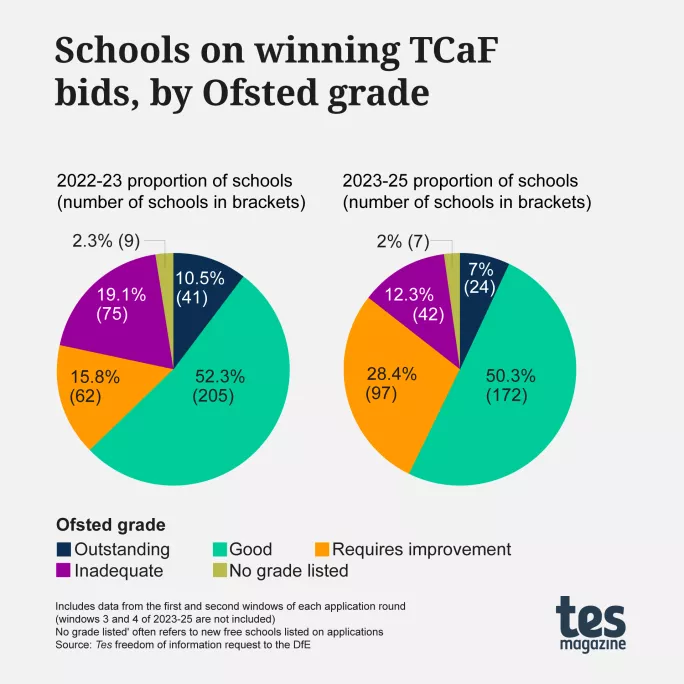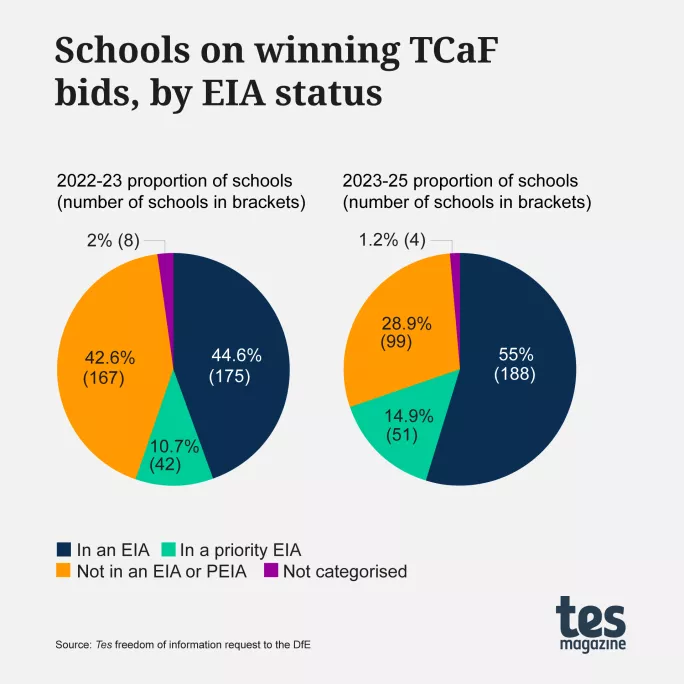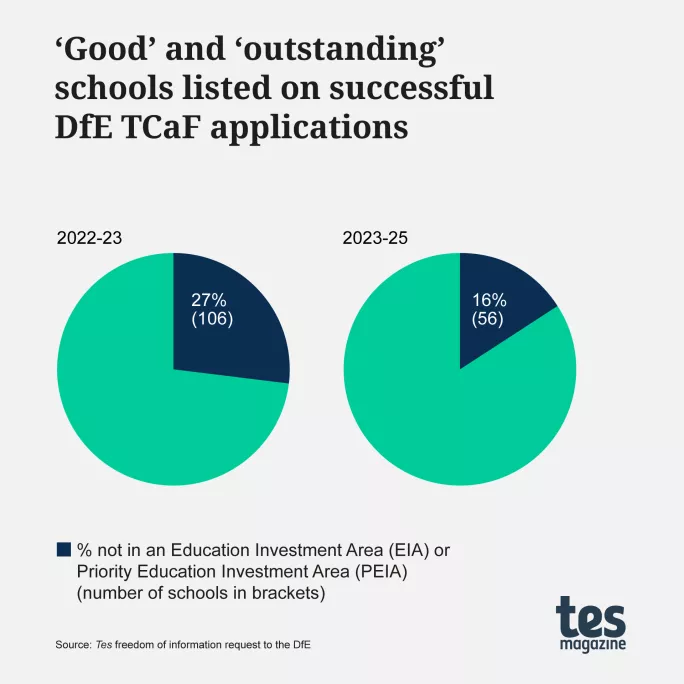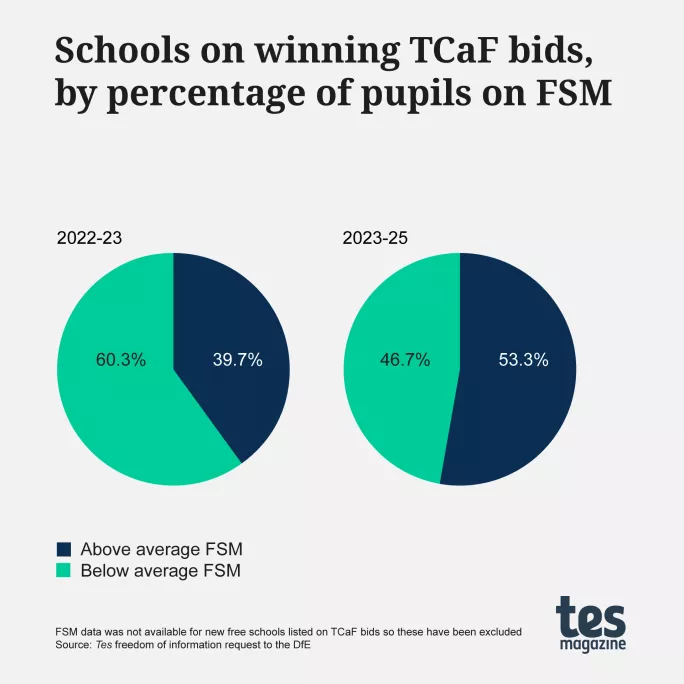Revealed: Where trust capacity funding goes

There are big pots of cash up for grabs for academy trusts with growth plans - but decisions over how this funding is allocated can feel like a “closed world” to leaders.
Now, a Tes investigation as part of our MAT Tracker tool sheds light on how the Department for Education’s Trust Capacity Fund (TCaF), which runs to tens of millions of pounds, is being allocated.
The DfE describes TCaF as a grant “to help trusts develop their capacity to grow, helping schools, particularly underperforming schools in priority areas, to become part of those trusts”.
While trusts are incentivised to take on challenging schools, it has been unclear - until now - to what extent they are doing so.
Our analysis of schools listed in winning bids finds:
- The majority are rated “good” or “outstanding” by Ofsted.
- One in four (27 per cent) were neither “underperforming” nor in an Education Investment Area (EIA) last year - though this has since fallen to 16 per cent.
- Around half have above-average disadvantage levels.
Meanwhile, bids have been rejected from more than two dozen MATs planning to support underperforming schools.
Our findings have sparked questions from leaders as to whether trusts have a “moral imperative” to use the cash to take on schools facing the most difficult circumstances - and whether the DfE could better support this.
The analysis has also fuelled calls for more clarity over how the funds are handed out, with leaders saying this can feel “random” and like a “lucky dip”.
The names of trusts that successfully bid for TCaF money are routinely published, along with the amounts handed out - but crucially not the schools that trusts plan to use the funding to take on.
However, Tes has now obtained this information.
- MAT decisions: What are the DfE’s regional advisory boards?
- Growth: 9 in 10 large MATs expect to grow by 2025
- MAT Tracker: Mapping the country’s multi-academy trusts
Most TCaF schools ‘good’ or ‘outstanding’
The DfE said having all schools in high-quality trusts is the key to improving educational outcomes. Concerns have been raised in the past over “orphan schools” being left with no academy trust sponsor to take them on.
TCaF therefore prioritises bids from trusts planning to take on schools in EIAs or those classed as “underperforming” due to being “inadequate” or “requires improvement” according to Ofsted.
But Tes’ analysis shows most winning TCaF bids go to trusts planning to take on “good” and “outstanding” schools - many which are also outside of investment areas, although this proportion is falling.

There were two TCaF windows in 2022-23, and there will be four across 2023-25, with each funding round having slightly different criteria.
Bids often include multiple schools, and there were 392 schools listed in successful bids for 2022-23, dropping to 342 for the first two windows of 2023-25.
Of these, just over a third (35 per cent) of schools listed in 2022-23 were rated by Ofsted as “requires improvement” (62) or “inadequate” (75), a freedom of information request to the DfE reveals.
This rose to 41 per cent in the first two windows of 2023-25.
The majority of schools listed in both rounds were rated “good” and “outstanding”: 63 per cent in 2022-23, falling to 57 per cent in 2023-25. The rest were either new free schools or did not have an Ofsted grade available for another reason.
‘Moral imperative’ to turn around struggling schools
Overall, around 93 per cent of all maintained schools in England are rated “good” or “outstanding”, leaving a relatively small pool of “underperforming” schools to be academised and brought into a trust.
But Benedick Ashmore-Short, CEO of Prometheus Schools, who formerly ran Park Academies Trust and Astrea Academy Trust, said there is a “moral imperative” for trusts to identify struggling schools and turn them around.
He added: “If you’re given TCaF funding and are taking on schools that are actually good schools, then there’s a concern because [the money] is not being used to improve the schools that need it most.”
In 2022-23, just over half (55 per cent) of the 211 successful bids involved at least one “underperforming” school, Tes’ FOI request revealed.
This rose to 62 per cent in the first two windows of the 2023-25 round, when the most an individual trust could receive for taking on at least one underperforming school in an EIA grew from £310,000 to £500,000.
Majority of winning bids in EIAs
EIAs are aimed at supporting areas of the country where educational outcomes are the weakest, amid a widening of the disadvantage gap across all phases of education.
Trusts are also increasingly naming schools in EIAs on their TCaF applications.
In 2022-23, 175 schools listed on successful bids were in EIAs, and 42 were in Priority Education Investment Areas, making a combined total of 55 per cent.
This has increased to 70 per cent in the first two windows of 2023-25.

As well as including schools in EIAs, TCaF applicants are encouraged to demonstrate how a trust’s plans for the funding will deliver objectives set out in the trust development statement for EIA areas produced by each region.
These statements summarise the education challenges faced in each area and set out where the DfE would like trusts to move into and where it would like maintained schools to convert, or to join or form trusts.
Luke Sparkes, chief executive of Dixons Academies, which runs 17 academies in Yorkshire and the North West, said TCaF grants have helped his trust to scale up, ahead of growing in new cities and taking on challenging schools.
“Given our mission, we believe additional funds should be skewed towards helping school trusts to make a difference where it matters most,” he added.
‘Random’ judging criteria
Despite this overall aim, our analysis finds that 106 schools listed on successful bids in 2022-23 were “good” or “outstanding” and located outside an investment area - amounting to one in four overall.
This fell to 16 per cent (56) of schools in the first two windows of the 2023-25 round.
Meanwhile, 26 trusts included at least one underperforming school on their bid and were still denied funding.

Peter Cooper, CEO of Heart of Mercia Trust, told Tes the trust had applied for TCaF funding to help it take on a “requires improvement” school in the 2023-25 round, but the bid was rejected, despite the school being one of the “top priorities” for the local regional advisory board.
The five-school trust is now potentially taking on a nearby school that has had three “requires improvement” judgements and is in an area with low key stage 4 performance.
Mr Cooper said the trust applied for TCaF funding once more in the latest window but was rejected again, and was told verbally that this was because the school is not in an EIA.
“It’s very frustrating and disappointing,” he told Tes. “It feels as if rural communities - particularly ones with low performance, are not being supported to move beyond that and increase what is one of the lowest rates of MAT education in the country.
“We weren’t aware that our odds were very low if the school isn’t in an EIA - it seems to be random as to the criteria by which the bids are judged,” he said.
The trust was “prepared to invest time and resources” in its community but “it is a deterrent to know that the DfE won’t help in any way and are deaf to the area’s needs”, he said, and added: “My trustees are rightly reluctant to do all the heavy lifting themselves.”
Above-average FSM pupils in half of TCaF schools
In the latest available data, just over half of the schools listed on successful TCaF bids had above-average numbers of disadvantaged pupils on free school meals (FSM).
Across England, 23.8 per cent of pupils are eligible for free lunches.
In 2022-23, a minority - 40 per cent - of schools listed in TCaF bids had above-average FSM. This has risen in 2023-25 to 53 per cent.

Some 248 trusts applied for funding in 2022-23, and 211 trusts have applied across the first two windows of TCaF 2023-25.
Eligible applications are assessed both regionally and nationally, and trusts can submit multiple applications across windows.
Two trusts - Pathfinder Multi Academy Trust and Bellevue Place Education Trust - have had applications rejected more than once. These have both been contacted for comment.
Some trust leaders say there needs to be more clarity over the TCaF bidding process.
“The challenge with TCaF is that it’s quite a closed world of knowing who and how it’s going to be allocated to,” said Mr Ashmore-Short of Prometheus Schools.
He added: “I would want to know when you apply, who assesses it, who decides whether it is viable, how much impact the regional director has. Transparency around that decision-making process would be helpful.”
Applying can feel like a ‘lucky dip’
It would also be useful, he said, to have a document for TCaF similar to the commissioning high-quality trusts document, to ensure the funding goes to trusts with sufficient expertise to support struggling schools.
“It should be a simpler, clearer process with greater accountability once the funding has gone to a trust,” he said.
One academy trust executive who has overseen successful and rejected bids said applying could feel like a “lucky dip”.
This “encourages trusts to use external agencies to help them with bids”, they told Tes.
And added: “It would be nice almost to have a point scoring mechanism for your application to see how those decisions are being made.
“I would also like to see more linkage between the process and the dialogue trusts have with the DfE and Education and Skills Funding Agency about applying for them.”
‘Very short’ timeframes
TCaF is separate from the Trust Establishment and Growth Fund, which is aimed more at establishing new trusts or for multi-academy trusts moving into new areas.
Trusts must have their growth plans approved by a regional director before applying for TCaF.
They can use the money for things like hiring new employees, staff training, new central services and relocation costs.
A deadline is set for these activities to be completed - usually by the end of the financial year.
The anonymous trust executive who has overseen successful and rejected TCaF bids said that the time periods in which money must be spent can feel “very short”.
“It almost encourages you to waste money because of it all needing to be spent in timescales that for us ended up coming down to months,” they said.
Applications are currently open for window four of the 2023-25 round. Activities will be allowed to start from 1 August 2024 and must be completed by 31 March 2025.
More spending ‘flexibility’ needed
Confederation of School Trusts deputy chief executive Steve Rollett also called for more flexibility over when the money could be spent.
He said: “Many trusts are keen to grow and share their expertise with more colleagues, and the TCaF is important in helping support that.
“Building capacity is a long-term project and we would like to see more flexibility in the spending timeline for the grants to ensure that trusts can fully embed new schools and systems in a sustainable way, rather than the current 31 March cut off.”
The DfE has introduced multi-year funding for TCaF 2023-25 that allows some trusts to spend grants over two years.
Rob Tarn, CEO of the Northern Education Trust, which runs 26 schools based in the North East, North West and Yorkshire, said TCaF had helped the trust recruit key roles while it was growing, but could be too restrictive.
“It can be difficult to recruit to new posts and the grant award doesn’t allow for the flexibility of switching the funds without having to resubmit a grant change with the DfE,” he said.
A DfE spokesperson has said that the department has “committed up to £86 million in funding until March 2025 to support more schools to be part of strong academy trusts”.
They added: “The Trust Capacity Fund is a competitive grant scheme to help trusts develop their capacity to grow, and so far we have received an unprecedented number of applications. In line with our published guidance, we have prioritised applications from trusts taking on underperforming schools in those areas of the country where educational outcomes are weakest”.
For the latest education news and analysis delivered directly to your inbox every weekday morning, sign up to the Tes Daily newsletter
You need a Tes subscription to read this article
Subscribe now to read this article and get other subscriber-only content:
- Unlimited access to all Tes magazine content
- Exclusive subscriber-only stories
- Award-winning email newsletters
Already a subscriber? Log in
You need a subscription to read this article
Subscribe now to read this article and get other subscriber-only content, including:
- Unlimited access to all Tes magazine content
- Exclusive subscriber-only stories
- Award-winning email newsletters
topics in this article



